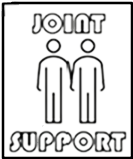
JOINT SUPPORT: A feasibility study to test a caregiver intervention for people with chronic pain
Title:
A feasibility study to assess the design of a multi-centre randomised controlled trial of the clinical and cost-effectiveness of a caregiving intervention for people with chronic musculoskeletal pain
Chief Investigator:
Dr Toby Smith
Funder:
National Institute for Health Research – Research for Patient Benefit
Sponsor:
University of East Anglia
Background to the study:
Long-term (chronic) bone, joint and muscle (musculoskeletal) pain causes disability whilst reducing quality of life and independence. People with chronic musculoskeletal pain often rely on family members or friends to take on roles as caregivers, helping in tasks such as washing, dressing, cooking, eating and shopping. Unfortunately caregivers are often under-prepared to do this. They are left to work out what to do themselves, and so ask the patient to do less than they could do for fear of causing harm. We suggest that a training programme to support caregivers in how to support people with chronic musculoskeletal pain could solve many of these problems, to improve patient health and well-being.
Aim of the study:
To conduct a feasibility study to see if a caregiver training programme (JOINT SUPPORT) can be provided in a NHS setting for people with chronic musculoskeletal pain and their caregivers, and how a future clinical trial may be designed.
Design and methods of the study:
This is a small-scale randomised controlled trial with interviews. We will test the JOINT SUPPORT programme and project design in a small way, to see if this can be made to work. We will recruit 80 patients with chronic musculoskeletal pain and their caregivers. 52 patients will receive the JOINT SUPPORT programme PLUS usual NHS care. The other 28 patients will receive usual NHS care. The JOINT SUPPORT programme involves 5, 1- hour group sessions with a patient and their main caregiver. This will be run by a trained physiotherapist or occupational therapist. They will discuss and 'up-skill' the caregiver and patient on topics including: exercise, lifestyle modification, problem-solving everyday tasks, education on pain, coping strategies and medication use. After the group sessions, they will be supported with 3 telephone calls, and a workbook. We will collect information on how well the project worked in recruiting people, providing the JOINT SUPPORT programme and collecting data. We will also interview patients, caregivers and health professionals to gain views on how the study worked for them. This will provide the information we need to know how, if feasible, a large study may be designed.
Status:
In set-up
Sites:
• Barts Health NHS Trust
• Royal National Orthopaedic Hospital NHS Trust
• The Royal Orthopaedic Hospital NHS Foundation Trust
• The Mid Yorkshire NHS Trust
Contact details:
Email: joint.support@uea.ac.uk
Twitter: @JOINT_SUPPORT
ISRCTN number: ISRCTN78169443
